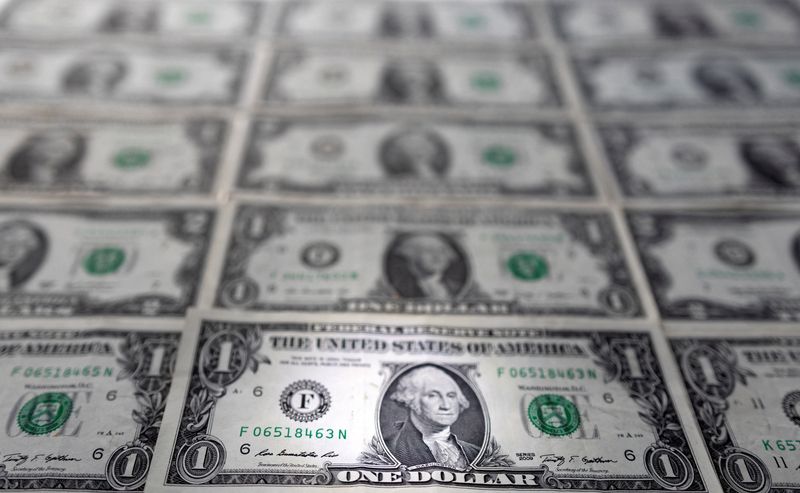
© Reuters. FILE PHOTO: U.S. dollar banknotes are displayed in this illustration taken, February 14, 2022. REUTERS/Dado Ruvic/Illustration
By Tom Westbrook
SINGAPORE (Reuters) – The dollar was under pressure near seven-week lows on Thursday as U.S. bond yields fell sharply after the Federal Reserve sounded close to calling time on interest rate hikes.
The Fed raised its benchmark funds rate by 25 basis points, as expected, but dropped language about “ongoing increases” being needed in favour of “some additional” rises, as it waits and watches how wobbling confidence in banks affects the economy.
Futures imply only an even chance of one more hike. That’s a contrast to Europe where markets see another 50 bp or so to go, and the gap sent the euro surging.
The dollar pared some of its losses when U.S. Treasury Secretary Janet Yellen set off another round of bank stock selling and jitters over stability by telling Congress she hasn’t considered or discussed blanket insurance for deposits.
The euro strengthened as much as 1.3% to its highest since early February at $1.0912, though by the Asian morning it had dropped back to bought $1.0872.
Sterling also shot to a seven-week high as British inflation unexpectedly rose, leaving it at an eye-watering 10.4% and heaping pressure on the Bank of England to raise rates and sound hawkish at its meeting later in the day.
Dollar/yen fell 0.7% overnight and was edging lower in the Asian morning at 131.19. Two-year Treasury yields fell 22 bps on Wednesday.
The shift in tone from the Fed makes it less likely that markets return to worrying that strong economic data is going to lead to more and more rate hikes, said NatWest Markets head of G10 FX strategy Brian Daingerfield.
“From the foreign exchange perspective, we think that argues for further dollar weakness as the ceiling for the Fed cycle has clearly come down.”
Financial markets have been roiled by wavering confidence in banks globally following a run on Silicon Valley Bank two weeks ago and the sudden demise of Credit Suisse.
The risk-sensitive Australian dollar recoiled sharply from a two-week high of $0.6759 to be back at $0.6707 on Thursday morning.
The New Zealand dollar also gave up overnight gains, but was firm in morning trade at $0.6238. Sterling bought $1.2282 after rising as high as $1.2334 overnight. Markets have priced a 25bp hike from the BoE.
The focus on the banking front is now primarily on U.S. regional lenders where worry of a contagious run on deposits remains elevated.
Fed Chair Jerome Powell said deposit flows have stabilised in the last week, and smaller lenders said they took some comfort from Yellen’s remarks that deposit insurance would be considered were there to be a contagion risk.
That “took the anxiety out of the room,” according to Daniel Kimbell, an executive at the local Passumpsic Bank in St Johnsbury, Vermont.
fell 3% to $27,360 after a series of U.S. Securities and Exchange Commission lawsuits over crypto promotion put a dampener on digital assets.
========================================================
Currency bid prices at 0050 GMT
Description RIC Last U.S. Close Pct Change YTD Pct High Bid Low Bid
Previous Change
Session
Euro/Dollar
$1.0875 $1.0856 +0.16% +1.47% +1.0876 +1.0854
Dollar/Yen
131.0750 131.3900 -0.18% +0.00% +131.4550 +131.1600
Euro/Yen
142.56 142.67 -0.08% +1.61% +142.7900 +142.4500
Dollar/Swiss
0.9168 0.9175 -0.07% -0.84% +0.9173 +0.9166
Sterling/Dollar
1.2285 1.2269 +0.11% +1.56% +1.2287 +1.2266
Dollar/Canadian
1.3708 1.3732 -0.17% +1.18% +1.3733 +1.3707
Aussie/Dollar
0.6707 0.6685 +0.35% -1.59% +0.6708 +0.6682
NZ
Dollar/Dollar 0.6238 0.6222 +0.27% -1.75% +0.6239 +0.6221
All spots
Tokyo spots
Europe spots
Volatilities
Tokyo Forex market info from BOJ







